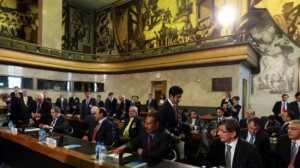 The United Nations sent out invitations Monday for the latest peace conference on Syria and Iran wasn't on the list, despite its role as a major backer of Syrian President Bashar al-Assad's regime.
The United Nations sent out invitations Monday for the latest peace conference on Syria and Iran wasn't on the list, despite its role as a major backer of Syrian President Bashar al-Assad's regime."Iran was not among the first invitations," a U.N. spokesman, Farhan Haq, said at a news conference, leaving the door open to another round before the conference begins Jan. 22.
In addition to the warring parties, others invited to Geneva are the five permanent members of the Security Council and about two dozen other countries, including Saudi Arabia.
The U.N.-Arab League envoy to Syria Lakhdar Brahimi has argued that because Saudi Arabia and Iran are deeply involved on opposite sides of the nearly three-year-old civil war, both should be invited to the conference. He has been supported by Russia and U.N. Secretary-General Ban Ki-moon.
The U.S. position has shifted from outright rejection toward a willingness to allow Iran to participate�but only if it accepted the outcome of the first Geneva conference held in June 2012. Those talks called for a "Syrian-led transition" in Damascus.
Whether Mr. Assad would be part of such a transition remains a big point of contention.
Iran wants to be invited, but without conditions, said an Iranian diplomat in New York.
On Sunday, Secretary of State�John Kerry�suggested that Iran could also contribute from the sidelines of the conference, even if not a full participant, "to help the process."
The State Department said Monday that the countries invited were part of a list that U.S., U.N. and Russian officials had agreed to in December. Iran wasn't on the list because it hadn't agreed to a government transition in Syria as a goal.
However, U.S. and Russian officials plan to meet again and will discuss Iran's participation, said Marie Harf, State Department deputy spokeswoman. She reiterated that Tehran must first publicly accept the communiqu� from the first Geneva conference.
Mr. Haq, the U.N. spokesman, said Mr. Kerry would meet Russian Foreign Minister Sergei Lavrov on Jan. 13 to discuss the conference. "We very much hope they will reach agreement on Iran's participation," he said.
Saudi Arabia and other Gulf Arab states are opposed to Iran�their regional rival�taking part, diplomats said.
Meanwhile, talks aimed at implementing an interim nuclear deal among Iran and six major powers will resume this week, the�European Union�said, as officials seek to have the accord take effect by late January.
By The Wall Street Journal�
The Iran Project is not responsible for the content of quoted articles.










